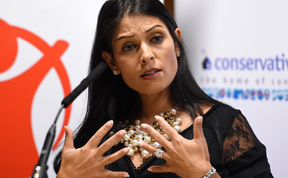 LONDON: Britain’s senior-most Indian-origin minister, Priti Patel, is facing a very serious prospect of losing her Cabinet post after it emerged that she had two further meetings with Israeli officials that were not disclosed through the proper procedure.
LONDON: Britain’s senior-most Indian-origin minister, Priti Patel, is facing a very serious prospect of losing her Cabinet post after it emerged that she had two further meetings with Israeli officials that were not disclosed through the proper procedure.
The international development minister, who was in Africa on an official visit to Uganda and Ethiopia, has had to abandon her tour and fly back to London “at the request of the Prime Minister”.
Downing Street, which has declined to comment further on the matter, had earlier said that Prime Minister Theresa May had accepted Patel’s apology over a series of meetings while she was on a holiday in Israel in August, without reporting them to the Foreign Office.
But new revelations about her further meetings with Israeli officials following that visit have made her position within the Cabinet very precarious.
It is understood Patel, 45, met Israel’s public security minister, Gilad Erdan, in the UK Parliament complex in early September and an Israeli foreign ministry official, Yuval Rotem, in New York later that month.
The British Prime Minister was reportedly told about the unreported New York meeting during Patel’s apology conversation at Downing Street on Monday but only learned about the unreported meeting with Erdan after the talks yesterday.
Ministers are required to tell the UK Foreign Office when they are conducting official business overseas, but it had emerged that British diplomats in Israel were not informed about any of Patel’s meetings which included a meeting with Israeli Prime Minister Benjamin Netanyahu and other political figures as well as charity organizations.
Opposition parties have been calling for Patel’s resignation as the minister in charge of the Department for International Development (DfID) and the country’s aid budget if it emerges that she breached the ministerial code of conduct.
Patel, the Conservative party MP for Witham in Essex, had issued an apology on Monday and attributed the unreported meetings to “enthusiasm”.
“In hindsight, I can see how my enthusiasm to engage in this way could be mis-read, and how meetings were set up and reported in a way which did not accord with the usual procedures. I am sorry for this and I apologies for it,” Patel said in her apology statement.
Her conduct had already led Theresa May to direct her Cabinet Office to look into tightening the ministerial code of conduct to avoid any such incidents in the future.
Downing Street was also forced to deny that Patel’s meetings in Israel had led to any change of political stance on the region after it emerged that in the wake of her visit in August, Patel had discussed potentially providing some of Britain’s aid money to Israel’s armed forces which run field hospitals in the Golan Heights area.
Britain does not officially recognize Israeli occupation of the area and DfID was reportedly advised against any such move.
Manuel Hassassian, the Palestinian ambassador to the UK, said the offer to send aid money to the Israeli army made a mockery of the British government’s claim to be “pushing for a two-state solution”.
“It was shocking for me a Cabinet minister breaking the ministerial protocol and meeting 12 officials, high-ranking, including Netanyahu,” he added.
Meanwhile, it is also being claimed that Patel deliberately avoided facing questions over the issue from MPs in the House of Commons yesterday, by bringing forward her flight to Kenya.
It was left to her junior, DfID minister of state for the Middle East Alistair Burt, to defend his boss’ actions in Parliament.
“The meetings were not particularly secret…If I had gone to Israel, I would have wanted a schedule like this,” he told MPs.
If Patel were to be sacked or forced to resign, Theresa May would lose a second senior minister within the space of a week, after Sir Michael Fallon stood down as defense minister amid allegations of inappropriate behavior towards female journalists.
Another of her close Cabinet allies, first secretary of state Damian Green, is also under investigation over misconduct allegations and foreign secretary Boris Johnson has been under fire over his handling of a case involving a British Iranian in prison in Tehran.
The British Prime Minister has been desperate not to shake up her already tenuous hold on Downing Street ever since her decision to call a snap general election in June backfired and lost the Conservative party its majority in Parliament.
But she has been increasingly seen as a weak leader trying to steady a very shaky regime.-PTI





